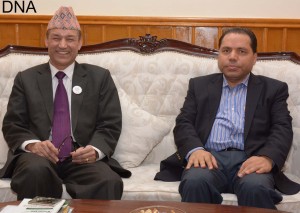Right to information laws need full implementation: Nepal CIC

ISLAMABAD, MAR 19 (DNA) – Krishna Hari Baskota Chief Information Commissioner National Information Commission, Nepal has said effective implementation of right to information law can surely help nations overcome problems such as good governance, corruption etc. adding Nepal government has implemented this law in letter and spirit.He was talking to a select group of senior journalists at the residence of Nepal ambassador Bharat Raj Paudyal. The chief commissioner was in Pakistan to take part in a regional conference on right to information, held in Islamabad.
Mr. Baskota further said, the South Asian nations are required to forge an alliance to ensure the use of RTI as a powerful tool to sustain and consolidate democracy by respecting the citizen’s Right to Know and Right to Information and agreeing on a Common Agenda to cooperate, reciprocate andincrease mutual understanding in various fields of RTI.
While spelling out salient features of his keynote address he said, “we must ensurefor our campaign to incorporate RTI as a Fundamental Right in our respective Constitutions, because Constitution is the main source of the law and it is a common document that is finding on all political parties. If we are able to include RTI in the constitution,the government will be compelled to maintain openness and accountability”.
He said about 104 countries have separate RTI legislations. We should continue our campaign to promote separate RTI legislation in all countries. This legislation should comply with Global Standards. The law should guarantee access the information held in Public Bodies.
“It is necessary to change the mindset of government employees towards openness and accountability. In Nepal we are trying our best to remove word confidentiality from civil servants oath”, he added.
He said, there was a secret behind why those in the government deny information to the people. The reason is they do not have proper documentation system.
Thus, we have to promote measures that ensure that citizens have easy access to public information. For this purpose digitization of records is essential.
This could be done through timely disclosure in website and easy linkages with other websites. Public information should be available in public libraries and other places easily accessible to the public. Likewise, we have to encourage enactinga Whistle Blower Protection and Privacy Act in countries of our region, Mr. Baskota added.
To ensure the efficacy of the system he proposed to promote RTI Audit system for peer competition and effective implementation of RTI legislation. National Information Commission, Nepal has already initiated RTI Audit in Ministry level. Likewise, we have to promote RTI Budget System in all project and programs.
“We must understand that RTI is a Main Gate to Promote Openness, Transparency and Accountability. In this context, I would like to request all of you to come up with a common understanding to effectively address this concern”.
He further said, government efforts alone are not sufficient to reinforce RTI as a powerful tool to strengthen democratic exercises. Political Parties, CSOs, NGOs, RTI Activists, Press, Journalist and Citizen across the board have to put in their efforts to implement RTI
The Information Commissions of the Region should not hesitate to punish public officials guilty of for not providing information. Similarly any loss and victimizations should be compensated to the citizen. I take this opportunity to inform you that the National Information Commission of Nepal has punished and compensated numerous public officials in such situations, he added.
Sharing Nepal’s experience the chief information officer said Nepal’s National Information Commission is working towards Open Government Data (OGD) initiative with the United Nations.
A sensitization workshop on OGD has already been organized and we are organizing othersuch events in the near future. Similarly, Nepal has initiated the process of acquiring membership of Open Government Partnership (OGP). For both OGD and OGP initiatives Government of Nepal has designated National Information Commission, Nepal as a focal point. I would like to call upon all South Asian Region Information Commissions to cooperate and collaborate in this movement.
“ I am pleased to inform you that National Information Commission of Nepal is planning to host a South Asian level Chief Information Commissioners and Information Commissioners Conference in Kathmandu in the near future”.
To a question he said, the issue of establishment of information commissioners in all SAARC countries shall be raised at the upcoming SAARC moot to be held later this year in Pakistan. Being the current secretary general of the SAARC Nepal would do its best towards this end.
He further told the Nepal Information Commission was comprised three members and he was the chief information officer. The commission is appointed by the government and can only be removed by the parliament.
The commission’s recommendations are binding. Even the commission has powers to punish those disobeying the commission’s orders. The punishment can range from Rs 2000 to 25000 depending on the nature of the case. =DNA
=====================
Related News

Elizabeth Kathryn Horst appointed Acting U.S. Ambassador to Pakistan
DNA ISLAMABAD, JUL 25: Elizabeth Kathryn Horst has assumed the role of Acting U.S. AmbassadorRead More

FM Ishaq Dar meets US top diplomat Rubio in Washington
WASHINGTON, JUL 25: Foreign Minister and Deputy Prime Minister Ishaq Dar met US Secretary ofRead More



Comments are Closed